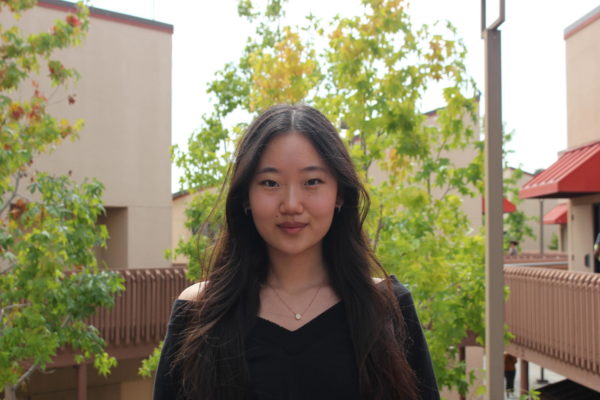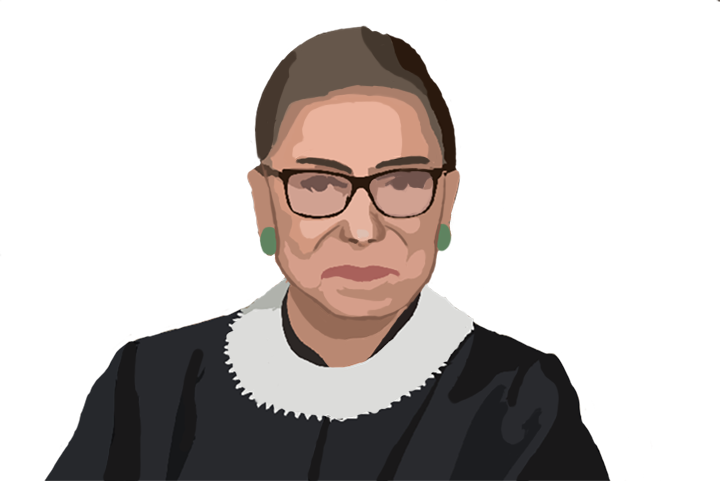Ruth Bader Ginsburg: In Celebration of Her Life
Supreme Court Justice Ruth Bader Ginsburg aimed to represent those discriminated against and in doing so became an icon for gender equality
Supreme Court Justice Ruth Bader Ginsburg fought fiercely for equity for all
On the evening of Sept. 18, 2020, Supreme Court Justice Ruth Bader Ginsburg, a champion of gender equality and an advocate for marginalized groups, passed away due to cancer complications. Known to many as “Notorious RBG” for her passionate but respectable dissents in court, she will be remembered forever as a righteous human being. No matter her political opinions, her gender, her religion or her identity, she became known as undeniably fair.
Before Ginsburg entered the wider public eye as a Supreme Court Justice in Aug. 1993, she held a relentless commitment to strive to be her best self for the sake of all those around her. She was enthusiastically encouraged by her parents to do so from a young age.
“My mother was very strong about my doing well in school and living up to my potential. Two things were important to her and she repeated them endlessly. One was to ‘be a lady,’ and that meant conduct yourself civilly, don’t let emotions like anger or envy get in your way. And the other was to be independent, which was an unusual message for mothers of that time to be giving their daughters,” Ginsburg said, in her autobiography, My Own Words.
In her path to being her best self, Ginsburg then went on to pave the way for women in America to be educated. Throughout her years at Cornell College and law school at Harvard College and Columbia University, Ginsburg devoted herself to her education as one of the only women in her classes. Her determination to educate herself is an admirable quality and serves as a reminder that everyone, no matter their gender, race, religion, or sexual orientation, can and should have the opportunity to learn.
After graduating, not a single law firm in New York City would hire her, even though she finished first in her class. From this experience and from observing the experiences of those around her, Ginsburg understood she needed to act to make change regarding gender based discrimination in the workplace, governmental representation and American society.
“The thing that I love and admire about her is that: she was able to see a system that wasn’t working for her and instead of trying to completely overthrow it, she was so strategic about the ways that she navigated it… She didn’t call it women’s rights… She fought for gender equality..It was really strategic for her to focus on it as gender equality versus women’s rights because that’s what was going to get people to listen to her…Her whole thing was: if I can set a precedent that this is gender discrimination, then I can take it and apply it to men, and then I can also take it and apply it to women,” history teacher, Alexandra Sheridan said.
Furthermore, Ginsburg knew that she had to appeal to her audience when she began to see gender inequality in America. Weinberg v. Wiesenfeld, one of Ginsburg’s landmark cases during the time she volunteered as a lawyer for the ACLU, in which a widower, whose wife’s income had been the primary one for their family, tried to earn benefits as a parent. The man, Stephen Wiesenfeld, learned that only women qualified to get these benefits. Ginsburg saw that this law discriminated against men’s rights to care for their children, so she successfully argued in front of the Supreme Court for Wiesenfeld and won.
Justice Ginsburg never hesitated to disagree wholeheartedly with her colleagues on the court. She is famous for her dissents, in which she powerfully detailed why certain court decisions were unjust. In Burwell v. Hobby Lobby Stores, Inc., in which the court ruled that specific companies were not required to pay for contraceptives for their employees. Ginsburg and three other Supreme Court judges at the time disagreed on this matter and Ginsburg wasted no time in explaining why. She pointed out that contraceptives could be highly expensive, companies should not assume that their employees have the same religious beliefs as them. Women should make their own choices, with the advice and consultation of their doctor, about contraception methods and options. Ginsburg’s strong assertion that women should have a right to choose shows that she is able to see and vouch for the different perspectives that the diverse American people have.
Accordingly, in the opening statements of Ginsburg’s Senate hearing upon her appointment to the Supreme Court, many senators remarked upon Ginsburg’s past legal achievements and her ability to work for what she wants.
“That is what the Supreme Court stands for in this country, and that is the Court where we expect people can go and say, ‘My rights are being trampled, and you, you nine people, are the only people that can guarantee the Constitution means what it says to us.’ That is the kind of Supreme Court Justice we want; not a Republican, not a Democrat, not a liberal and not a conservative, but somebody who looks first and foremost at the rights of ordinary people,” Sen. Leahy said, as documented in Ginsburg’s Supreme Court hearing.
Even in her Senate hearing, Ginsburg did not reveal her personal opinions on controversial matters, showing that an adequate Supreme Court justice would always look at both sides of arguments in relation to the law. Looking at both sides of arguments is a difficult task, but Ginsburg demonstrated that it absolutely can be done, and it can be done in a way that is respectful. Her incredible relentlessness in making decisions based on what is right reveals her best intentions in serving on the court, which is that she should do it, with guidance by the Constitution.
Interestingly enough, Justice Ginsburg’s best friend on the Supreme Court was Justice Antonin Scalia, who voted differently than her on many crucial issues, but they did not let this affect their friendship. The friendship of Ginsburg and Scalia serves as a key reminder that even if other people have different political opinions, their existence as humans is still valid. RBG’s consistent example in trying to see situations from every perspective demonstrates that it is important to have civil conversations about America’s politics, especially in an increasingly partisan atmosphere.
“I believe we lost one of the loudest and most powerful voices in the Supreme Court. Two justices have already spoken out about how they oppose same-sex marriage; one of the legalizations RBG fought for. Although two out of the nine justices are not the majority, the minorities have lost their communication line with the Supreme Court…Political discussions have changed from, “I would/wouldn’t like taxes to be higher on the upper class,” to, “I want/don’t want [insert minority group] to have [insert basic right].” Human rights should never have become a political issue.” junior Dorrin Sepehrdoust said.
So, I challenge you: Try to respect someone’s opposing opinion, and if you can’t, respect that person for having an opinion. As a nation, we will not get anywhere if we aren’t able to have simple conversations with each other about politics, or about controversial ideas. We are all entitled to have an opinion and a voice under the Constitution. If we follow Ginsburg’s example of being open-minded, we will have an America with much more tolerance.
True to her reputation, Ginsburg had a respectful awareness of others’ opinions and she always committed to making decisions strictly based on the law and on the idea of human rights that the Constitution protects, not based on her personal opinions.
“If they truly are students of the law, to allow the law to lead them, they surprise people often because they’re really not based off of a political ideology, but they’re doing their job as justices of the court,” history teacher Frank Harrington said.
So, how can we honor her memory? We must read the cases she argued and the dissents she wrote with care. Most importantly, we must learn about the importance of standing up for those who are treated unfairly, and work to protect their rights. We can do that by having conversations about equality and fairness with our classmates, friends, teachers, coaches, and families. Also, we can help fight for equality for minorities by voting for the people who will uphold the righteousness that RBG demonstrated throughout her entire life. The Constitution was written vaguely, especially in regard to the Supreme Court, and this is why it is important that Americans vote for people in power that will uphold the fairness and essence of the court as they make decisions on Supreme Court nominees. It is never too early to be involved in our American democracy. So if you are 16 or 17, you can pre-register to vote and can volunteer to work at the polls on election day.
As Americans and as students at Woodbridge, we must be inspired by Ginsburg’s sheer determination to fight for the subordinated minority and the marginalized, for that is what demonstrates her true identity: A woman of valor and strength– a woman who never ceased to respect the other side of the argument.
Click here to register to vote!
To read more:
ACLU History: Protecting Women’s Equality.” American Civil Liberties Union, 1 Sept. 2010, www.aclu.org/aclu-history-protecting-womens-equality?redirect=womens-rights%2Faclu-history-protecting-womens-equality.
“Justice Ruth Bader Ginsburg.” The Supreme Court Historical Society – Timeline of the Court – Justice Ruth Bader Ginsburg, www.supremecourthistory.org/history-of-the-court/the-current-court/justice-ruth-bader-ginsburg/.
“Ruth Bader Ginsburg: A Reading List: Home.” Washington and Lee University LibGuides, libguides.wlu.edu/c.php?g=601727.
Supreme Court of the United States. Shelby County, Alabama v. Holder, Attorney General, E.T. AL. No. 12-96, 2012
“Sally M. REED, Appellant, v. Cecil R. REED, Administrator, Etc.” Legal Information Institute, Legal Information Institute, www.law.cornell.edu/supremecourt/text/404/71.
“{{Meta.pageTitle}}.” {{Meta.siteName}}, www.oyez.org/justices/ruth_bader_ginsburg.
Your donation will support the student journalists of Woodbridge High School. Your contribution will allow us to purchase equipment and cover our annual website hosting costs.

Hi Warriors! This is my third year as a part of Golden Arrow and I am so excited to be an Opinion Editor and writer this year. I can't wait to write meaningful...

Hey Warriors! My name is Ruby Yang and I am so excited to serve as a Co-Editor-in-Chief. This is my fourth year in Golden Arrow and my second year as Co-EIC....









